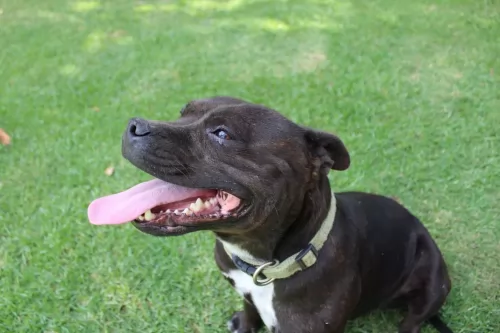 Petzlover
Petzlover Blue Lacy is originated from United States but Staffordshire Bull Terrier is originated from United Kingdom. Blue Lacy may grow 12 cm / 5 inches higher than Staffordshire Bull Terrier. Blue Lacy may weigh 6 kg / 14 pounds more than Staffordshire Bull Terrier. Both Blue Lacy and Staffordshire Bull Terrier has almost same life span. Both Blue Lacy and Staffordshire Bull Terrier has almost same litter size. Both Blue Lacy and Staffordshire Bull Terrier requires Low Maintenance.
Blue Lacy is originated from United States but Staffordshire Bull Terrier is originated from United Kingdom. Blue Lacy may grow 12 cm / 5 inches higher than Staffordshire Bull Terrier. Blue Lacy may weigh 6 kg / 14 pounds more than Staffordshire Bull Terrier. Both Blue Lacy and Staffordshire Bull Terrier has almost same life span. Both Blue Lacy and Staffordshire Bull Terrier has almost same litter size. Both Blue Lacy and Staffordshire Bull Terrier requires Low Maintenance.
 The Lacy brothers came to Texas in 1858, and this breed is named after them. They wanted a strong, robust working dog. It is a working/herding dog breed that originated in Texas in the mid 19th century.
The Lacy brothers came to Texas in 1858, and this breed is named after them. They wanted a strong, robust working dog. It is a working/herding dog breed that originated in Texas in the mid 19th century.
It is interesting to note that in June 2005, Governor Rick Perry brought about legislation adopting the Blue Lacy as the official Dog Breed of Texas. The breed is also registered by the National Lacy Dog Registry and the Animal Research Foundation.
Today the Blue Lacy is considered to be the perfect all-around dog, with the Lacy family history noting the breed to come from a mix of scent-hound, greyhound and coyote cross. There are theories around the scent hound used, with some believing it could have been an Italian Gray Hound, but whatever the case, the Lacy brothers established this breed under the guidelines required to develop a recognized breed.
 The Staffordshire Bull Terrier was first developed in the northern sections of Birmingham and in Staffordshire, England. The Staffie is a cross between a Black and Tan Terrie and the Bulldog, but had other breeds crossed in over time in order to create a bull-baiting dog and a fighting dog. In the Victorian age these sports were banned but dog fighting went underground and continues on some level today.
The Staffordshire Bull Terrier was first developed in the northern sections of Birmingham and in Staffordshire, England. The Staffie is a cross between a Black and Tan Terrie and the Bulldog, but had other breeds crossed in over time in order to create a bull-baiting dog and a fighting dog. In the Victorian age these sports were banned but dog fighting went underground and continues on some level today.
The Staffordshire Bull Terrier was exceptional at these “sports” due to his build, power and jaw strength. Today’s Staffie is a descendent of those early Bull Terrier crosses. Together with the Bull Terrier and the American Pit Bull, the Staffie also traces its roots back to those original English Bully dogs. All three breeds have the Bulldog in common.
After dog fighting and bull baiting were banned the Stafforshire Bull Terrier was further developed as a companion and pet. Still their reputation as fighting dogs cost them recognition in the official kennel clubs for some time. They finally made the UK registry in 1935, but it was not until 1974 that the American Kennel Club (AKC) accepted them.
 The medium-sized, well proportioned, muscular and lithe Blue Lacy stands at roughly 46–53cm. He has a coat which is smooth and short and in an attractive gun-metal gray color which can be classified as blue or almost black. Other shades are also available such as cream, yellow, reddish and you also get tri-colored Lacy’s.
The medium-sized, well proportioned, muscular and lithe Blue Lacy stands at roughly 46–53cm. He has a coat which is smooth and short and in an attractive gun-metal gray color which can be classified as blue or almost black. Other shades are also available such as cream, yellow, reddish and you also get tri-colored Lacy’s.
Pure Blue Lacy’s have some white markings on their brisket. Whatever color you have, these clean-looking dogs with their low maintenance coats are referred to as Blue Lacy’s. Their brown eyes are bright and alert, they have long tails and their ears hang down.
The American Blue Lacy gives one the sense of speed, agility and endurance. He is intelligent, active and alert, being an all-round dog who can adapt to being among ranchers and cowboys and then become gentle with children and his family.
With socialization, he is also tolerant of other dogs. Because he is so intelligent he can be quickly trained, and training and socialization will be recommended for him to ensure he is the perfect all-rounder he was designed to be. His alertness makes him an excellent watch dog.
 The Staffordshire is a muscular, stocky and unusually strong breed, small to medium size in height and build. They have broad, powerful chests, wide set, strong legs, strong shoulders, broad head with a fairly short muzzle. Their ears are not cropped but they are short and fold over. The coat is stiff, close and short and the tail is medium and carried low. Most Staffies are brown, but they can be red, brindle with white, fawn, black, white or blue.
The Staffordshire is a muscular, stocky and unusually strong breed, small to medium size in height and build. They have broad, powerful chests, wide set, strong legs, strong shoulders, broad head with a fairly short muzzle. Their ears are not cropped but they are short and fold over. The coat is stiff, close and short and the tail is medium and carried low. Most Staffies are brown, but they can be red, brindle with white, fawn, black, white or blue.
 Your Blue Lacy is such a low-maintenance, easy dog to have. Remember to have your puppy vaccinated from distemper, hepatitis, leptospirosis, parvovirus, and parainfluenza. These vaccinations start from 6 - 8 weeks of age. Also, because different areas have different regulations surrounding the rabies injection, check with your vet about this one.
Your Blue Lacy is such a low-maintenance, easy dog to have. Remember to have your puppy vaccinated from distemper, hepatitis, leptospirosis, parvovirus, and parainfluenza. These vaccinations start from 6 - 8 weeks of age. Also, because different areas have different regulations surrounding the rabies injection, check with your vet about this one.
A socialized, trained Blue Lacy makes such an awesome pet but you have responsibilities towards him. You need to know precisely what is required to keep him healthy and happy.
This is a versatile working dog who is intelligent and alert but also sensitive to being mistreated. Treat him decently and in exchange you’ll have a loyal, devoted canine family member.
 1.Children friendliness The breed adores children but care should still be taken because they are so strong and their jaws are so powerful.
1.Children friendliness The breed adores children but care should still be taken because they are so strong and their jaws are so powerful.
2.Special talents they adore children and they one of the most powerful jaws among canines.
 The Blue Lacy is generally a healthy breed, but just like with any other dog breed they will be prone to some health conditions. Blue Lacys can also suffer with the likes of hip or elbow dysplasia and hypothyroidism.
The Blue Lacy is generally a healthy breed, but just like with any other dog breed they will be prone to some health conditions. Blue Lacys can also suffer with the likes of hip or elbow dysplasia and hypothyroidism.
This is a disease of the hip where the ball and socket joint is malformed. Hip dysplasia is when the hip joints don’t develop normally. It needs to be watched as it can result in loss of function of the hip joints. The disease can often begin when the dog is still very young.
Some breeds are genetically predisposed towards hypothyroidism, but environmental factors and certain medications can trigger autoimmune reactions. Not only that, a tight collar can also cause thyroid damage. The symptoms of hypothyroidism are weight gain, skin problems, dislike of the cold and even hair loss and then it’s time to get your pet thyroid-tested.
 • Patella luxation otherwise known as a slipped kneecap- can cause pain and some lameness.
• Patella luxation otherwise known as a slipped kneecap- can cause pain and some lameness.
• Skin allergies and even a tendency toward Mange which is chronic in some forms and fatal in others.
• Like most active dogs their size, they are susceptible to bloat which can be fatal if not treated immediately.
 Typically of working breeds, the Blue Lacy is going to need a firm owner who provides guidance and leadership, and who is responsible with providing the Lacy with plenty of exercise. This dog was created for work, so they will be totally at home on a farm. If not, they will require long walks every day with lots of ball games too.
Typically of working breeds, the Blue Lacy is going to need a firm owner who provides guidance and leadership, and who is responsible with providing the Lacy with plenty of exercise. This dog was created for work, so they will be totally at home on a farm. If not, they will require long walks every day with lots of ball games too.
Care for the Blue Lacy doesn’t take much effort. He isn’t much of a shedder and therefore has low grooming requirements. He’ll require being brushed twice a week to get rid of loose hairs. If you start early with this grooming routine, he looks forward to this ‘bonding’ session.
Routine maintenance will require nail clipping and teeth cleaning as plaque can build up and leave your pet with dental problems and gum disease. Ask your veterinarian about dental care because there are special dog-designed toothpastes and brushes. Also check for ticks and fleas in and around the ears of your dog.
Your Blue Lacy is a high energy working dog so he will require a balanced diet to cater for his energy levels. He will certainly require some raw meat from time to time to avoid skin problems. Home prepared meals are also good and these can include rice, meat and vegetables.
Remember when in any kind of doubt, speak to your vet about dog food which meets the requirements of your dog, his age, his breed and his activity levels. Always have a bowl of clean, cool water available to him around the clock.
 1.Feeding the puppy Don’t over feed as he grows fast. Feed a high quality dog food for medium size puppies. Feed 1-2 and a quarter cups in 3-4 meals per day.
1.Feeding the puppy Don’t over feed as he grows fast. Feed a high quality dog food for medium size puppies. Feed 1-2 and a quarter cups in 3-4 meals per day.
2.Feeding the adult Don’t exercise right before or after eating due to potential for bloat. Feed 1-2 times a day a high quality medium breed dog food.
4. Games and Exercises They are terriers after all and they dig. Need a fairly large yard with a strong fence. They love to play ball, frisbee and can excel at cart pulling.